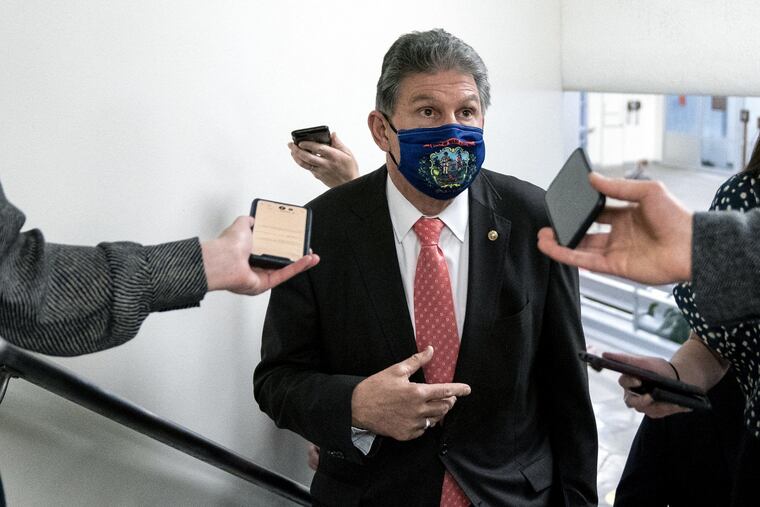Ten Senate Democrats and Republicans say they reached five-year, nearly $1 trillion infrastructure deal
Their early agreement calls for about $974 billion in infrastructure spending over five years.

A bipartisan group of 10 Senate Democrats and Republicans reached a new deal on infrastructure on Thursday, agreeing to a nearly $1 trillion, five-year package to improve the country’s roads, bridges, pipes and Internet connections.
The new blueprint, described by four people familiar with the plan, marks a fresh attempt to resurrect negotiations between congressional lawmakers and the White House after an earlier round of talks between President Joe Biden and the GOP fell apart this week. But it remains unclear if the early accord will prove to be enough to satisfy either the White House or a sufficient number of lawmakers on Capitol Hill at a time when disagreements between the parties are rife.
The new deal is the product of five Democrats and five Republicans: Bill Cassidy, R-La.; Susan Collins, R-Maine; Joe Manchin, D-W.Va.; Lisa Murkowski, R-Alaska; Rob Portman, R-Ohio; Mitt Romney, R-Utah; Jeanne Shaheen, D-N.H.; Kyrsten Sinema, D-Ariz.; Jon Tester, D-Mont.; and Mark Warner, D-Va.
Their early agreement calls for about $974 billion in infrastructure spending over five years, which comes to about $1.2 trillion when extrapolated over eight years, according to the people familiar, who spoke on the condition of anonymity because the details had not yet been released formally. The package includes roughly $579 billion in new spending.
Democrats and Republicans agreed to focus their investments on what they see as core infrastructure, and their plan does not include any new tax increases to finance the spending, the four people familiar with the plan said. But it does appear to wade into politically fraught territory by proposing changes to the gas tax. Lawmakers do not plan to raise the rate, but they do seek to index it to inflation, according to one of the people familiar, meaning consumers' costs at the pump could rise.
The overall package is larger than the plan that GOP lawmakers, led by Sen. Shelley Moore Capito, R-W.Va., presented to the White House in recent days - a proposal that Biden ultimately rejected as insufficient. Capito and her colleagues had put forward more than $300 billion in new spending over eight years, with the rest set to come from regular legislative efforts to fund federal programs in areas such as transportation and water.
At the same time, though, the new bipartisan Senate compromise is still less than the $2.2 trillion Biden initially endorsed in his package, called the American Jobs Plan, or the revised, roughly $1 trillion price tag he sought in his last round of negotiations with the GOP. Biden has maintained that any infrastructure package should be premised almost entirely on new spending, and he has remained committed to a broader view of infrastructure than some Republicans support.
And the president has held steadfastly against any financing mechanism that raises taxes on Americans who make under $400,000 annually. The White House has made it clear to the group of 10 senators that the indexing provision, as well as any discussion about an electric vehicle mileage tax, would violate Biden's red line and that he would reject it, according to another person familiar with the negotiations.
Announcing the deal, the 10 Senate lawmakers described their effort as a "realistic, compromise framework to modernize our nation's infrastructure and energy technologies."
"We are discussing our approach with our respective colleagues, and the White House, and remain optimistic that this can lay the groundwork to garner broad support from both parties and meet America's infrastructure needs," they said in a joint statement.
The White House did not immediately respond to a request for comment.
Even before they had announced their compromise, some lawmakers on Thursday sounded an optimistic note about their prospects, recalling the role that a similar group of Democrats and Republicans had played only months earlier. With Congress at a logjam over another round of coronavirus relief, a bloc of House and Senate moderates helped shepherd to passage a $908 billion package that President Donald Trump signed into law before leaving office.
"I just remember all you guys back in November saying . . . you're not going to get there," Warner told reporters earlier in the day. "And in fact we got there. Wouldn't it be great if we surprised you twice in a single year?"
But lawmakers face an even tougher task on infrastructure than they did with stimulus aid. Democrats possess only a narrow majority in the Senate, requiring any new package of public works spending to attract at least 10 GOP votes to advance. That supposes there are no Democratic defections, a challenge given the fact that some party lawmakers - in the Senate as well as the House - argue they should spend more, not less, on infrastructure.
Fearing any compromise could quickly collapse, Senate Democrats say they are starting to lay the groundwork to try to advance infrastructure spending on their own using a budget process known as reconciliation that requires 51 votes, not 60, to pass. Even that process, however, is fraught with political difficulty since some Democrats including Manchin say they are not yet ready to abandon bipartisan talks.
In the hours before the Senate adjourned for the week - and lawmakers released their compromise - Senate Majority Leader Charles E. Schumer, D-N.Y., said he was awaiting further details about the deal now taking shape.
“I’ll look at it,” he said. “But we continue to proceed on two tracks - a bipartisan track and a reconciliation track - and both are moving forward.”